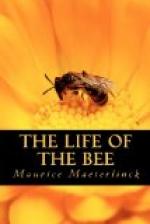And then there is silence once more; and, in an instant, this mighty tumult, this awful curtain apparently laden with unspeakable menace and anger, this bewildering golden hail that streamed upon every object near—all these become merely a great, inoffensive, peaceful cluster of bees, composed of thousands of little motionless groups, that patiently wait, as they hang from the branch of a tree, for the scouts to return who have gone in search of a place of shelter.
[38]
This is the first stage of what is known as the “primary swarm” at whose head the old queen is always to be found. They will settle as a rule on the shrub or the tree that is nearest the hive; for the queen, besides being weighed down by her eggs, has dwelt in constant darkness ever since her marriage-flight, or the swarm of the previous year; and is naturally reluctant to venture far into space, having indeed almost forgotten the use of her wings.
The bee-keeper waits till the mass be completely gathered together; then, having covered his head with a large straw hat (for the most inoffensive bee will conceive itself caught in a trap if entangled in hair, and will infallibly use its sting), but, if he be experienced, wearing neither mask nor veil; having taken the precaution only of plunging his arms in cold water up to the elbow, he proceeds to gather the swarm by vigorously shaking the bough from which the bees depend over an inverted hive. Into this hive the cluster will fall as heavily as an over-ripe fruit. Or, if the branch be too stout, he can plunge a spoon into the mass; and deposit where he will the living spoonfuls, as though he were ladling out corn. He need have no fear of the bees that are buzzing around him, settling on his face and hands. The air resounds with their song of ecstasy, which is different far from their chant of anger. He need have no fear that the swarm will divide, or grow fierce, will scatter, or try to escape. This is a day, I repeat, when a spirit of holiday would seem to animate these mysterious




